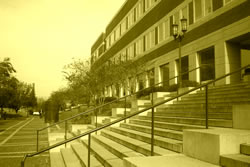March 28th: Derrida's
Positions
Leading Class Discussion
Let's have our fourth "Leading Class Discussion" participant(s) come up and start us off.
Let's make sure we talk a little about the Rhetoric/al Project (due 4/25). Make sure I don't forget to hand back your "Midterm Mini-Rhetorical Analysis" essays.
Derrida's Positions
The three interviews shouldn't be considered a totality of Derrida's ideas; nor should we think all of deconstruction is answered. As he was quoted in his obituary, "deconstruction requires work"; therefore, its meaning can't be handed to you.
Terms to Define
I think the following terms need to be defined, so we're all (somewhat) on the same page. This discussion is our introduction to Derrida, but his influence will be felt for quite some time:
- Phenomenology: the study of the structure of experience; reflection of consciousness.
- Existentialism: the idea that human (individual) existence comes from experience, that of the individual.
- Structuralism: studying culture as a system made up of identifiable connections that are all related to a grand structure, an overarching paradigm.
- Post-Structuralism: well, this is structuralism "deconstructed." What? Refer to p. 41 in Positions.
- Liguistic terms
- grammatology: writing doesn't reproduce speech (the window pane theory); instead, everything to do with writing constructs/affects meaning.
- phoneme: basic (smallest) unit in a language that builds words. (think phonetic...do re mi)
- grapheme: words, punctuation, numbers--they don't carry meaning themselves
- Absolutist/Monolithic Critiques
- logocentrism: the Western assumption that "the word" is the superior conveyor of meaning, one that has an identifiable in an ideal form.
- différance:
1) "the systematic play of differences, of the traces of differences, of the spacing by means of which elements are related to each other" (p. 27)
2) "reference to a present reality [or meaning] [is] always deferred" (p. 29)
- transcendental signified: the first cause or zero point--absolute origin.
Now, we just need to figure out where to go next. If I haven't already, let me mention my approach to Derrida and, more importantly, teaching Derrida.
Discussion Questions/Points
Derrida list several homonyms--words that sound alike but have different meanings (p. 40 and 42). Let's consider some English words:
eight/ate
band/banned
beaut/butte
bight/bite/byte
brows/browse
whose/who's
Derivatives of cat?
cat, catsup, Catawba, catch
Let's get into groups and try to "trace" meaning in the following terms:
widow, crime, slut, chaos, education
The linearity of Bob Dylan.
Deconstruction
Let's try to deconstruct, if possible, the following passage from the preface of Ashley Montagu and Floyd Matson's The Dehumanization of Man:
It neither kills outright nor inflicts apparent physical harm, yet the extent of its destructive toll is already greater than that of any war, plague, famine, or natural calamity on record—and its potential damage to the quality of human life and the fabric of civilized society is beyond calculation. For that reason this sickness of the soul might well be called the “Fifth Horseman of the Apocalypse.” Its more conventional name, of course, is dehumanization (p. xi).
Next Week's Reading
Next week (4/4--can you believe it'll be April next week) we continue into postmodernity with Lyotard's The Postmodern Condition. Don't forget to read the Appendix--pp. 71-82.
.. |
